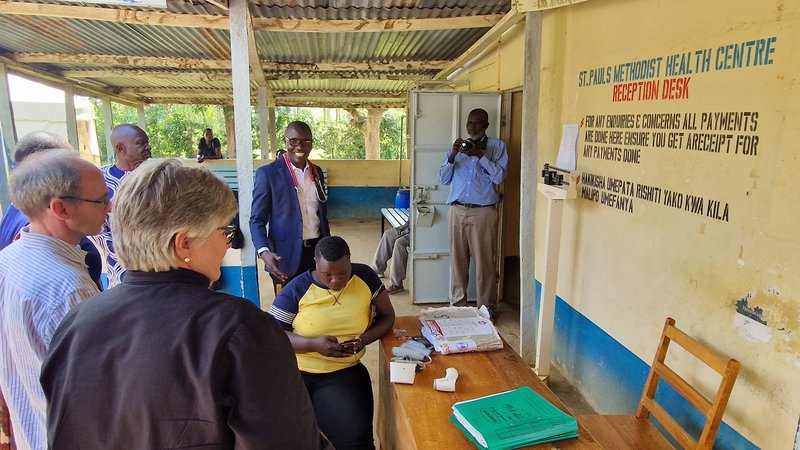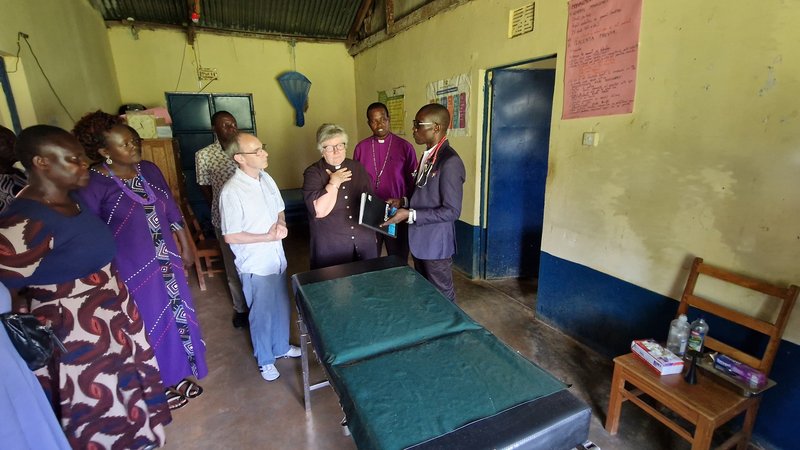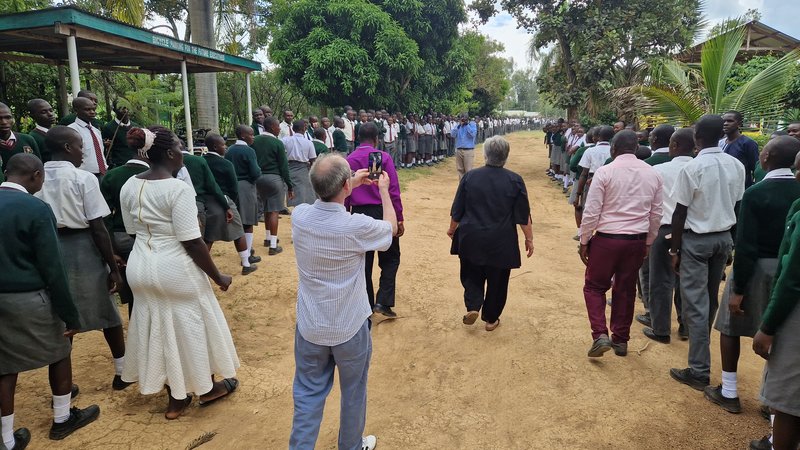19 November 2024
Helen Cameron visits Kisumu Synod in Kenya
Kisumu Synod: Providing Health and Education in rural Kenya
“Thank you for coming to visit us.” It is one of the most commonly heard phrases during visits to partner churches, particularly in remoter areas and was repeated everywhere we went. It is difficult to overstate how highly our historic partnership and friendship with global partners are valued.

During Helen Cameron’s Presidential visit to Kenya and Uganda, we visited the Kisumu Synod in Western Kenya - the largest Synod in the country. Here, in a vast rural area inhabited by 23% of the population of Kenya and which borders Lake Victoria and Uganda, the Methodist Synod comprises 30,000 members spread across 68 churches/societies in 12 circuits. In one of those Circuits, we visited the only Health Centre in the area and a High School at Ugunja. The Clinic, established in 2001, is the only Methodist hospital in western Kenya and provides both preventative and Community Health Care services. However, resources are limited and conditions are basic. There is a shortage of beds, a shortage of basic drugs and medical equipment and a shortage of staff.

The maternity unit delivers a high number of babies, but the maternity facilities are minimal. There is a diagnostic centre which is vital for treatment and prevention of diseases but equipment is limited and it frequently malfunctions. Despite all of this, the 16 staff show an admirable level of dedication and commitment to their work and the care of patients and the clinic is clearly popular. Without the government funding contribution that is provided, it is unlikely that the Clinic would be able to provide the kind of services which it does. And as is the case with many health facilities around Africa, without the provision of the Methodist Church, the clinic would not exist at all.
From the clinic, we drove to the local Methodist Secondary School, one of the most significant Methodist educational institutions in western Kenya. Approaching the school, we were met by all 580 pupils lined up on either

side of the road singing songs of greeting, eager to welcome us and to develop educational links with schools in the UK.
In Kenya, 43% of the population are under 15 and 78% of the population are under the age of 34. There is a huge problem (as in many countries in Africa) with extremely high unemployment. The problem is particularly acute in Western Kenya which is a rural region, where young people are at high risk of being radicalised and being drawn into a life of crime, or even being offered money by extremist groups to join militant groups committing violence against institutions.
According to the 2022 data published by the Kenya National Bureau of Statistics, young people aged below 29 years, both Secondary School and College Graduates, are the hardest hit by unemployment. One of the consequences of this is that Kenya has recently faced weeks of sometimes violent unrest (much of it by young people) caused by the lack of opportunity for ordinary people, and corruption amongst political leaders. While the ongoing agitation has literally changed the political discourse, there is great concern that it could get out of hand and lead to a breakdown of law.
Since the visit, the World Mission Fund of MCB have agreed to fund an initiative to assemble 75 young people for a two–day non-boarding meeting to explore the following:
- Locally available business opportunities and how the youth can access them and benefit from them.
- Online money-making opportunities that the youth can engage in using their smartphones and at the comfort of their homes.
- How to push for good governance through non-violent means.
- Positive thinking for better mental health.
This is a unique initiative which has received warm support from the local government.
Our visit to the Kisumu Synod raised the following questions:
- What connections can we make between British Methodist Schools and those Methodist schools run by our global partners?
- Can we/how do we encourage exchanges – of staff/of pupils?
- What online mutual learning opportunities might be possible with the widespread use of modern technology?
Christian Medical Institutions across Africa struggle to fund both staff and facilities. Challenges include: Many Institutions are old (often established by missionaries up to 100 years ago) and so building maintenance is ongoing and costly; hospital equipment is extremely expensive; Churches find it hard to pay staff a salary equivalent to State levels and therefore staff retention is a constant struggle.
- Can we help identify human and financial resources to support medical facilities run by our international partners? (As partners, ‘pointing the way’ to bodies that may be able to help?)
- Requests for exchanges (both ways) are often made – so that staff can learn from international colleagues. Are there ways in which such exchanges can be facilitated?
- Is it possible to promote more online encounter/learning opportunities for those with medical skills?
After the visit, Helen wrote: “Visiting the Western Synod made my own experience of a large British District fade into insignificance. This Synod covers a huge area, and the work undertaken is of the highest standard even when limited by few resources. I pray that a links between one of our British Methodist Schools and the school in Kisumu is possible because there is so much energy and desire for partnership there”.